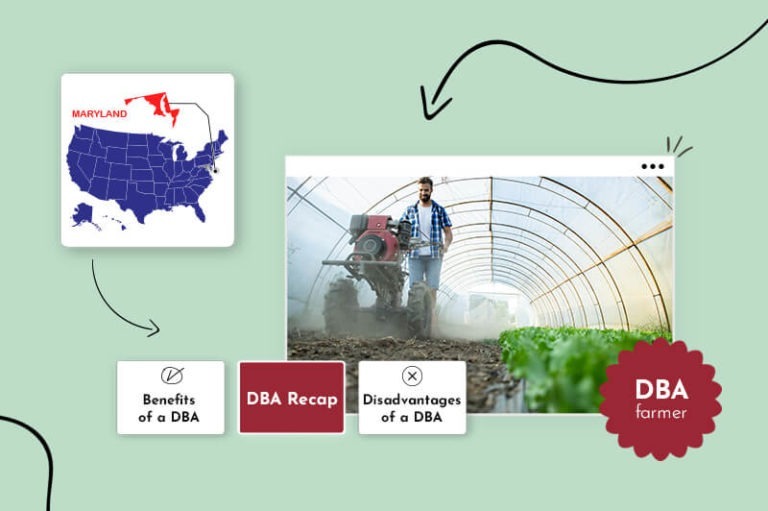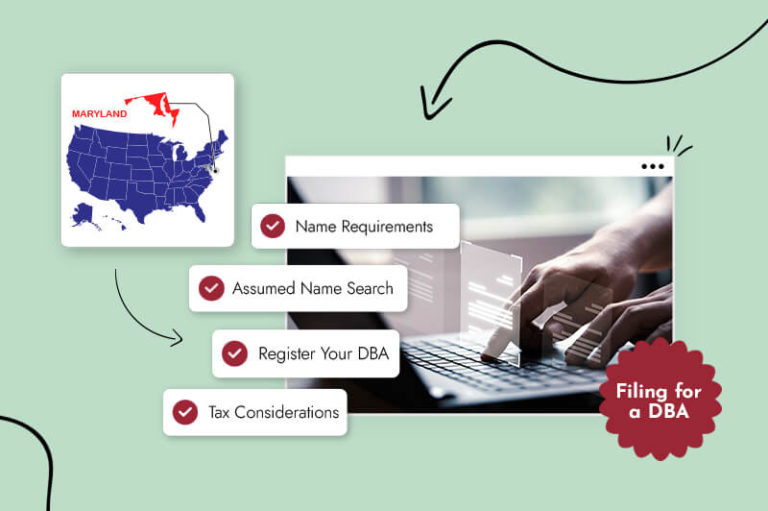
There’s a lot to think about as you form an LLC in Maryland. You could be well on your way to securing valuable liability protection — and peace of mind — but you’ll need to complete a lot of paperwork that reflects how your business operates.
As you proceed, remember: The name of your business underscores everything you do, so it’s important to choose carefully. If you’re not 100 percent happy with your legal business name, it’s time to take action.
Depending on how you want to run your business, you may benefit most from using an assumed name. Also known as a trade name or DBA, this is an important step in operating sole proprietorships, general partnerships, and even LLCs. The better you understand how DBA works and when it’s advisable, the more likely you are to select a naming strategy that benefits your business.
Are you confused about the concept of DBAs as they pertain to running an LLC or other type of business in Maryland? We’ve outlined all of the essential details on Maryland DBAs below, so keep reading to learn more:

Before we define the acronym DBA, it helps to know what it is not: a legal business structure. Rather, DBA is used by a variety of entities, including:
Simply put, DBA is an acronym for “doing business as.” This phrase accurately describes the purpose of the DBA: to help entities do business under assumed names. In other words, a business with a DBA will be known to the public by another title rather than its legal name.
While some states outright reference this concept as DBA or a fictitious name, Maryland uses the phrase “trade name” to describe any business title that is not an entity’s legal name.
If you’ve already gone through the trouble of designating a legal business name, you might wonder: Why deal with the extra hassle of securing a DBA?
In some situations, a DBA simply isn’t worth the extra effort. More frequently, however, businesses and professionals find that DBA designation delivers a variety of advantages that simply cannot be gained by forming an LLC.
The most compelling benefits of securing a DBA or trade name in Maryland include:
Businesses that operate in multiple states often take advantage of the unique flexibility that DBAs provide. Under this approach, it’s easier to expand business operations and pursue new opportunities such as special products or services.
Rather than requiring existing businesses to launch completely new entities, DBAs provide more targeted branding. After all, they’re registered via existing business structures.
If you prefer to remain a sole proprietor but don’t want to do business under your own name, a DBA is your best bet. By creating an official business name, you can shape how you’re perceived by clients, creditors, or vendors.
Many sole proprietors are surprised to discover that they’re taken far more seriously after they’ve established trade names. Filing a DBA is one of the fastest and most affordable means of gaining an elite level of credibility, particularly for sole proprietors who are not yet ready to gain LLC status.
While it takes some modicum of effort to secure a DBA in Maryland, this is far easier than establishing an LLC. As such, the DBA approach may be preferable for sole proprietors or partners who have no interest in going the extra mile to start LLCs. Securing a DBA should also be far more affordable than starting an LLC and keeping it in good standing.
For some entities, obtaining a DBA is primarily a matter of necessity. Sole proprietors, for example, will need to secure trade names if they don’t want to refer to their business by their own first and last names. With LLCs however, DBAs are purely optional.
There’s a lot to love about DBA designation in Maryland, but this approach has its limitations. Before you complete a trade name application, it’s crucial that you understand what, exactly, a Maryland DBA can and cannot accomplish. As such, we’ve highlighted a few of the most significant disadvantages below:
The answer is simple: no! There is no active requirement for filing a DBA in Maryland. It’s perfectly acceptable to do business under your legal name — and in select situations, this is actually preferable.
That being said, it is necessary to file a DBA if you intend to use a trade name. As we’ve discussed, this requirement is especially relevant if you plan to remain a sole proprietor rather than start an LLC.

Now that you have a basic grasp of what a Maryland DBA involves and why it’s worth considering, it’s time to determine whether you actually want to move forward with securing an additional name.
It helps to understand the DBA requirements specific to the state of Maryland. To provide maximum insight, we’ve outlined all of the essential steps involved in choosing your name and registering your DBA:
Maryland maintains a variety of strict trade name requirements that must be considered before you select your DBA. When in doubt, avoid anything that:
Before you register a Maryland DBA, you should feel confident that your preferred name is actually available. The Maryland Business Express website provides an easy-to-navigate search tool, which should provide valuable insight into existing business entities with similar names.
A thorough search is essential, as your failure to find similar names could result in the rejection of your trade name application. Begin the process by simply typing the name of your intended DBA in the search box. If any similar trade names exist in the state of Maryland, they should promptly appear.
To be safe, complete a few additional searches featuring terms similar to those found in your desired trade name.
Once you’ve found an acceptable name, it’s time to register with the Maryland State Department of Assessments & Taxation (SDAT). Use the official trade name application to complete your request.
In addition to the application, you’ll need to submit a $25 filing fee. Checks must be payable to the Department of Assessments & Taxation. If you require expedited service, be prepared to pay an extra $50.
Same-day processing is also available, but this is far more expensive: it costs $425. This added fee will ensure that, if your application is submitted between 8:30 am and 2:30 pm, it will be reviewed within three hours. Under this arrangement, filings that are rejected can be reviewed the business day after they’re resubmitted.
If you prefer to submit a hard copy of your application without rush or expedited processing, you’re welcome to deliver it by hand to the drop box at the SDAT lobby. This is located at 301 West Preston Street in Baltimore.
No matter what method you use to file your trade name application, it will need to include an identification number assigned by the SDAT. It consists of one letter followed by eight digits.
Whether filed online, by mail, or in person, the standard application will also include:
If you intend to file for multiple trade names, you will need to submit one application per DBA.
The state of Maryland allows LLCs and other businesses to register trade names online via the Maryland Business Express website. Before completing this process, it’s necessary to create an account. It’s also worthwhile to review the state’s fee schedule, as all filings completed online (including trade name applications) are considered expedited.
If you prefer to file your trade name application by mail, send both the appropriate form (and a $25 or $75 check) to the following address:
Department of Assessments and Taxation
301 W. Preston Street, Room 801
Baltimore, Maryland 21201
Although you can feel reasonably confident in your DBA’s validity if you’ve conducted a thorough name search, there is no guarantee that it will be accepted.
You’ll know for sure when the SDAT sends an official acknowledgment of acceptance. This notice will be sent to the address provided on the trade name application. Typically, the SDAT responds within four weeks of the trade name’s acceptance.
Once your DBA has been accepted, it will remain in effect for five years. During the final six months of this five-year period, you will have the opportunity to renew your DBA for an additional five years.
If you fail to do so in a timely manner, the trade name will be canceled by the SDAT. This forces you to complete another application to keep your DBA current.
You don’t necessarily have to file for a trade name, but this is needed if you want to take full advantage of the DBA benefits highlighted above. State law mandates that all businesses operating under assumed names officially register their desired trade names.
Without a trade name, you risk falling out of compliance with Maryland business laws. If caught, your business could be classified as “not in good standing.” This phrase might not seem like a big deal, but it could lead to the forfeiture of your business if the situation is not promptly resolved. Once your business is forfeited, it cannot legally operate in the state of Maryland.
DBA designation does not equate to a separate business structure, so it shouldn’t have a discernible impact on how your business is taxed. As you determine which entity is preferable for tax reasons, look instead at the potential for pass-through treatment.
A Maryland DBA or trade name can be a valuable option for protecting your business. While this will not confer any clear legal or tax advantages, it offers a variety of compelling benefits that can be secured with modest effort.
Think carefully about whether a trade name might be a good idea for your Maryland business — and don’t hesitate to seek help if you struggle to navigate the process on your own. There’s a lot to be said for extra flexibility and peace of mind, both of which are well within reach.
This portion of our website is for informational purposes only. Tailor Brands is not a law firm, and none of the information on this website constitutes or is intended to convey legal advice. All statements, opinions, recommendations, and conclusions are solely the expression of the author and provided on an as-is basis. Accordingly, Tailor Brands is not responsible for the information and/or its accuracy or completeness. It also does not indicate any affiliation between Tailor Brands and any other brands, services or logos.
Products
Resources
@2024 Copyright Tailor Brands